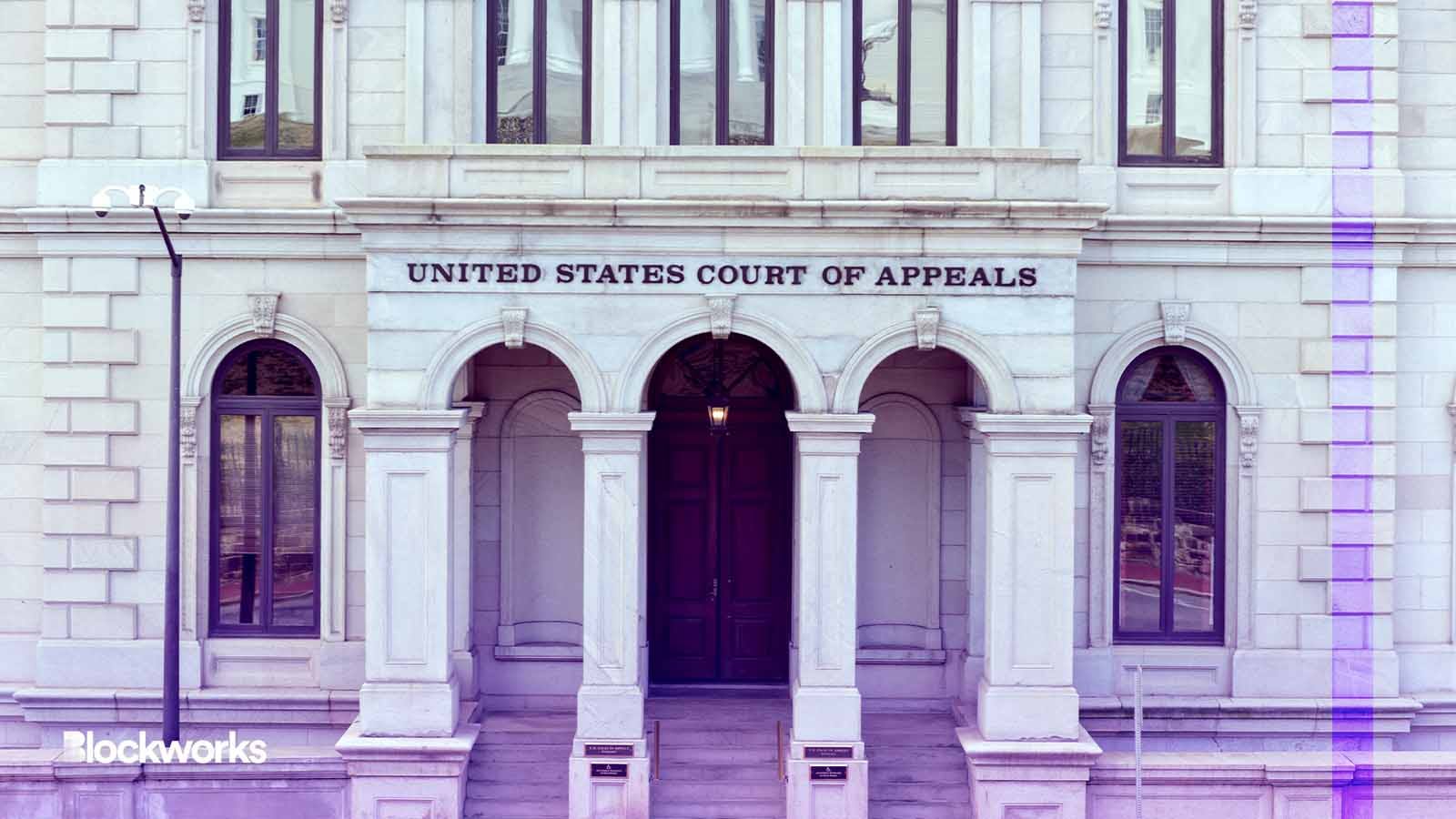What the judges said: unpacking the Grayscale court ruling
A panel of judges said the SEC did not explain its reasoning on multiple fronts when denying Grayscale’s ETF petition

Felix Lipov/Shutterstock modified by Blockworks
On Tuesday, the United States Court of Appeals DC Circuit sided with Grayscale in its legal battle against the US Securities and Exchange Commission over its ETF conversion plan.
However, the win does not mean that Grayscale can immediately convert its Bitcoin Trust (GBTC) product to an ETF. Rather, the SEC must now re-examine Grayscale’s application — which it previously denied.
A three-judge panel was convened for the opinion, and in a 3-0 ruling agreed that the SEC’s rejection of the proposal was “arbitrary and capricious.”
The opinion was signed by Judges Neomi Rao, Sri Srinivasan, and Harry Edwards.
The SEC, Judge Rao wrote, did not properly “explain its different treatment of similar products” when it rejected the Grayscale bid.
Read more: Grayscale appears to win opening salvo in bitcoin ETF case vs SEC
The 21-page opinion examines the arguments both sides put forward following Grayscale’s 2022 lawsuit against the US securities regulator.
Today’s developments represent a major development in the long-running push by numerous companies to score approval for a spot bitcoin ETF. Such an approval has been floated by advocates as a key way to connect crypto markets with more traditional markets.
While the SEC has allowed the listing of exchange-traded products tied to crypto futures, it has thus far remained resistant to a spot crypto ETF — a position that prompted the Grayscale lawsuit and, ultimately, today’s ruling.
Arguments dissected
According to the judges, the SEC’s arguments against Grayscale fell short.
“The Commission’s unexplained discounting of the obvious financial and mathematical relationship between the spot and futures markets falls short of the standard for reasoned decisionmaking,” the judges wrote.
They noted that Grayscale — specifically, Donald Verrilli Jr. — had provided the court with evidence that CME bitcoin futures prices are 99.9% correlated with spot market prices.
The SEC did not dispute the data provided by Grayscale and did not suggest “that market inefficiencies or other factors would undermine the correlation.”
Instead, the SEC argued Grayscale did not provide enough evidence, but did not explain what evidence it wanted from the company.
The judges further argued that the Commission was “unreasonable” in faulting Grayscale for not providing enough information to support its claims that “any fraud or manipulation in the underlying [spot] market will affect both products in the same way.”
To put it simply, the SEC offered an “insufficient” explanation.
The judges also reiterated several times throughout their opinion that the SEC’s “reasons for differentiating Grayscale from the bitcoin futures ETPs…fall short.”
A checkered history
The judges also honed in on the fact that, to date, the SEC has rejected “every proposal to list a bitcoin ETP.”
The SEC had previously said that the products are “designed to prevent fraudulent and manipulative acts and practices.” However, the SEC did grant its approval for bitcoin futures ETPs on the basis of the inclusion of surveillance-sharing contracts.
Yet according to today’s ruling, the accuracy of the correlation between bitcoin futures prices and spot market prices shows that “fraud in the spot market would present identical problems for a bitcoin ETP and a bitcoin futures ETP.”
“Because the spot bitcoin market and the CME bitcoin futures market are so tightly correlated, a price distortion in the spot market will be reflected in the price of the futures market. After all, futures are derivatives of the spot market,” the judges pointed out.
According to the judges, the SEC never explained how a surveillance-sharing agreement with the CME would be sufficient to protect the bitcoin futures ETPs from fraud, but not Grayscale’s products.
Enough evidence?
The SEC claimed that the proposed bitcoin ETP would have an influence on the price of the bitcoin futures traded on CME. The agency further claimed that Grayscale’s assets -– valued at roughly $30 billion — “might dwarf” the CME’s bitcoin futures market, with its roughly $2 billion in open contracts.
However, according to the judges, the SEC “did not adequately connect the value of Grayscale’s assets to the conclusion that those assets would influence prices in the CME futures market.” Grayscale can only impact the futures market through the spot market simply because Grayscale doesn’t own futures contracts.
“Grayscale holds just 3.4 percent of outstanding bitcoin, and the Commission did not suggest Grayscale can dominate the price of bitcoin,” they argue further.
In another example, the SEC failed to adequately explain why it believed Grayscale did not properly estimate the potential for growth and the effect that potential could have on the futures market if the ETP was approved.
The judges highlighted that the SEC did not explain how a spot asset’s growth potential could impact the CME’s bitcoin futures market “which is the market under surveillance.” They emphasized the difference between the spot asset and futures market.
“Grayscale’s evidence directly addressed the Commission’s concerns — if trading in Grayscale has a minimal impact on the price of bitcoin, it necessarily follows that trading in Grayscale will have a minimal impact on bitcoin futures,” they said.
Additionally, the approvals of both the Teucrium and Valkyrie ETPs “seem to apply equally to Grayscale, but Grayscale’s listing was denied.”
Get the news in your inbox. Explore Blockworks newsletters:
- The Breakdown: Decoding crypto and the markets. Daily.
- 0xResearch: Alpha in your inbox. Think like an analyst.






